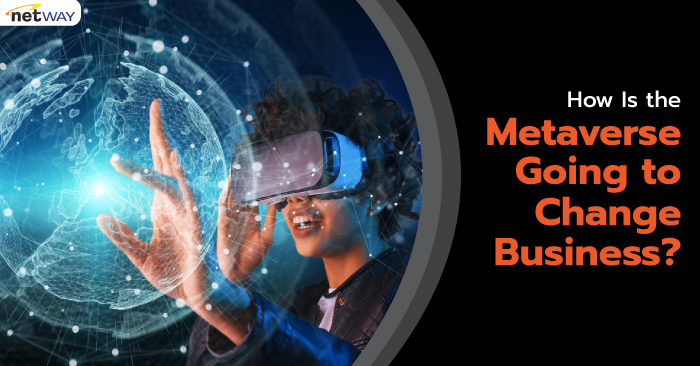-
Welcome to My Website
This is a text box. Write your own content here. This is an excellent place for you to add a paragraph.
How Is the Metaverse Going to Change Business?






There has been a considerable amount of buzz around the concept of the metaverse. While the idea has historically been associated with video games, Facebook’s rebrand to Meta introduced the metaverse to mainstream media.
Additionally, Google has been working on its own approach to connecting the digital and physical worlds through augmented reality (AR). Even Microsoft has invested significantly in virtual workplaces and working spaces.
Despite the recent buzz, the metaverse is still a relatively unknown concept. Most might know it as having something to do with virtual reality (VR) and gaming. But what exactly is the metaverse, and what are its implications on the future of business?
What is the metaverse?
The concept of the Metaverse isn’t as new as it seems. In fact, the word “metaverse” has existed for almost three decades now. Author Neal Stephenson was the first one to use the word “metaverse” to describe a 3D virtual world.
Within this world, individuals were represented as animated characters called avatars. These avatars could engage with other individuals as well as computer-operated entities. While all of this stems from his 1992 novel, Snow Crash, it serves as a basis to understand what tech companies are trying to accomplish.
The metaverse concept seen today is similar to Stephenson’s vision. Tech companies such as Facebook are developing in-depth virtual worlds where users can socialize, play games, and even work. There’s a heavy focus on virtual reality within these metaverses as well. Companies are working on incorporating VR headsets to increase immersion and add a more personal touch.
While there are many different platforms that call themselves metaverses, the reality is that nothing has lived up to the concept drawn out in Snow Crash. The popular game Fortnite is a self-proclaimed metaverse, but it really just serves as a game with an explorable world. This is a common theme in the gaming universe, and unfortunately, these solutions lack the depth and versatility a metaverse should theoretically offer.
What is the point of a metaverse?
Human limitations are directly linked with the physical world. These limitations range from communication and coordination to travel time and physical location. The metaverse is seen as a solution to these limitations. By using virtual reality, humans can sidestep many of these physical limitations by developing the rules and world themselves.
Within a virtual world, people can experience going to work and walking into an office building without having to leave home. They can interact with coworkers, coordinate projects, and host engaging virtual meetings with more functionality than Zoom, Microsoft Teams, or other online meeting software. All without the commute.
A metaverse can also be seen as the next step in social media. Currently, interactions in social media are text-based. Metaverses could make these interactions more versatile and personal by adding a more realistic touch. Instead of a video call, friends could explore the virtual world and create experiences. Families can have virtual get-togethers to accommodate the restrictions of the pandemic.
Metaverses are only limited to what can be programmed and designed. This means that the potential use cases of a metaverse are essentially limitless. And the only real limits are computational power and the human imagination.
How can the metaverse benefit businesses?
The potential applications of a metaverse are endless. In fact, many experts have dubbed the metaverse “the future of digital businesses”. Here are a few ways the metaverse can benefit business organizations:
Digital item sales
The metaverse introduces new demand for a variety of digital items. Users will want to customize their avatar, purchase accessories and items, and even purchase experiences and services within the metaverse. This creates new opportunities in digital sales and adds new demand for graphics designers, programmers, and more.
New Currencies
Cryptocurrency is becoming more prevalent across the globe, and it will be even more vital in a metaverse ecosystem. Currently, the majority of up-and-coming metaverse platforms utilize blockchain technology. This helps to facilitate buying and selling within the metaverse and ensures financial transactions are executed securely.
Blockchain and cryptocurrency have introduced interesting advantages over the conventional finance industry. A metaverse may just be the opportunity finance companies need to incorporate some of these advantages and benefits within their own systems.
Greater collaborative efforts
Collaboration over Zoom or MS Teams is convenient, but it can also be restrictive. By establishing digital conference rooms, the metaverse can retain the flexibility of video conferencing while imitating the effectiveness of physical meetings.
Additionally, virtual reality can provide an entire workspace as opposed to a simple video call. This can help facilitate creativity and promote a more cohesive environment. It can also help keep employees more engaged in their work and connected overall which is critically important with work from home or a remote workforce.
Virtual storefronts
Virtual real estate is a fast-growing investment opportunity. In fact, the blockchain-based platform, Decentraland, has seen several multi-million dollar property sales in the last few months. With that kind of price tag, it isn’t just retail investors buying up property. Investment firms and corporations are betting on the future of online business and storefronts.
The metaverse could serve as an opportunity for online businesses to offer a more engaging experience instead of just a website. A VR storefront could create a better purchasing experience for the buyer, as well as offer a more personal touch.
Is the metaverse really the future of business?
Current metaverse solutions are quite a ways off from the concepts introduced in science fiction. However, with companies like Facebook joining the development process, it may not be such a far-off idea. The concept of the metaverse introduces a lot of opportunity and potential. Businesses from a wide variety of industries could benefit from the increased popularity of virtual reality.
However, a metaverse will undoubtedly require a considerable amount of bandwidth and infrastructure to support it. The design and implementation of digital items, buildings, and storefronts will require significant programming and support. While there may be an upfront investment, going virtual is a possibility that many companies could take advantage of in the future.
Outsource IT provides a wide range of IT services for companies of all sizes and will continue to do so even when businesses transition to the metaverse. With decades of experience, we understand the issues and problems companies face in this digital age, while keeping up to date with new technologies. Contact an Outsource IT account manager to learn more about how we can serve your business IT needs.
Is Your Business Ready for the Next Digital Transformation? Contact us today to schedule a technology brainstorming session. Netway Communication open 24x7
📲: 02 055 1095
📧: support@netway.co.th
👨💻Web chat: https://netway.co.th/
💙Facebook Messenger: @netway.official https://www.facebook.com/netway.official
💚Add Line ID: @netway https://bit.ly/line-netway
บทความในส่วนนี้
-
Handy Tips to Optimize a Dual Monitor Setup for the Best Experience
Updated on 2025-01-13 01:43:44
-
Netway KB template
Updated on 2023-10-19 07:29:28
-
วิธีตั้งค่าห้องประชุมให้แสดงบน Room Finder และ Microsoft Teams
Updated on 2023-12-06 09:46:57
-
วิธีการเปิดใช้งาน Microsoft Loop app
Updated on 2023-12-07 02:19:21
-
Have You Had Data Exposed in One of These Recent Data Breaches?
Updated on 2025-01-13 01:59:22

-
Domain
-
Hosting
-
Cloud & Managed
-
SSL
-
Email
- เรียนรู้เพิ่มเติม
- Microsoft 365 รุ่นต่างๆ
- Microsoft 365 สำหรับธุรกิจ
- Microsoft 365 สำหรับใช้งานที่บ้าน
- ทดลองฟรี
- G Suite
- เทคนิคลดต้นทุนอีเมล Microsoft 365 มากกว่า 28%
- เทคนิคลดต้นทุนอีเมล G Suite มากกว่า 19%
- Zimbra-Based Email
- Traditional Email by cPanel
- Physical to Cloud Migration
- Exchange Server to Microsoft 365 Migration
- G Suite to Microsoft 365 Migration
- Microsoft 365 to G Suite Migration
- Cloud to Cloud Migration
-
Microsoft
-
Google
-
Marketing
-
Others
-
Blog
-
Microsoft Teams
-
microsoft-365-business-premium
-
test-slide
-
Order
-
Promo